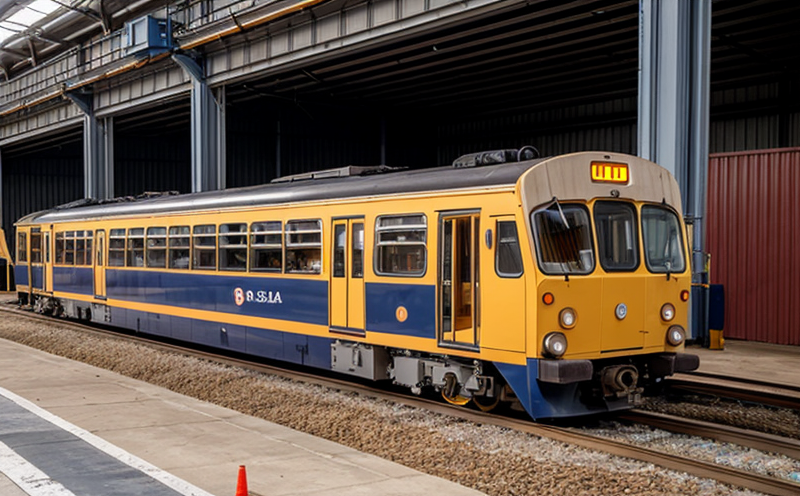EN 13979-1 Fatigue Testing of Wheels for Passenger Vehicles
The European Standard EN 13979-1 provides stringent guidelines for fatigue testing of wheels intended for use in passenger vehicles. This standard is critical to ensuring the structural integrity and safety of railway rolling stock, which can be subject to severe stress during operation.
Understanding the intricacies of wheel design and functionality is essential when it comes to compliance with EN 13979-1. The standard outlines the methodology for determining the fatigue life of wheels under cyclic loading conditions that mimic real-world operational scenarios. This includes both static and dynamic loads, which are crucial in assessing the durability and reliability of materials used in wheel manufacturing.
The testing process involves a series of controlled stress cycles applied to specimens representative of actual wheel components. These tests simulate the anticipated service life, providing valuable insights into potential failure modes and areas requiring improvement. Compliance with this standard is not only mandatory for manufacturers but also ensures that end-users receive products designed to meet stringent safety standards.
At Eurolab, we utilize advanced testing equipment tailored specifically for EN 13979-1 compliance. Our facilities are equipped with state-of-the-art instrumentation capable of replicating the exact conditions specified in the standard. This includes precise control over loading parameters and environmental factors such as temperature and humidity.
Our experienced engineers ensure that every aspect of the testing procedure adheres strictly to EN 13979-1 requirements, from sample preparation through final analysis. We employ rigorous quality assurance practices throughout each step to maintain consistency and accuracy in results.
- Sample Preparation: Proper handling and preparation are critical for accurate fatigue testing outcomes. Our lab follows detailed protocols to ensure that samples are representative of actual wheel components.
- Loading Conditions: We simulate real-world loading conditions using sophisticated machinery designed to apply controlled stress cycles.
- Data Acquisition: Advanced sensors provide comprehensive data on the behavior of wheels during testing, allowing for precise evaluation of fatigue performance.
The results from these tests are invaluable in identifying any weaknesses within wheel designs early in the development stage. This allows manufacturers to make necessary adjustments before full-scale production begins, thereby reducing costs associated with rework or recalls later on.
By adhering strictly to EN 13979-1 standards during our fatigue testing processes, we contribute significantly towards enhancing overall safety and reliability across all aspects of railway rolling stock operations. Our commitment to quality ensures that customers receive reliable data they can trust when making decisions about their products or procurement strategies.
Why It Matters
The importance of fatigue testing for wheels cannot be overstated, especially in the context of passenger vehicles operating within a railway environment. Ensuring structural integrity through rigorous testing helps prevent accidents caused by component failures due to excessive wear and tear over time.
Compliance with EN 13979-1 goes beyond mere regulatory requirements; it plays a vital role in safeguarding public safety. By adhering to these standards, we help protect passengers from potential hazards associated with compromised wheel components. This is particularly important given the high speeds and rigorous operating conditions often encountered by modern passenger trains.
From an operational perspective, meeting this standard translates into reduced maintenance costs and increased vehicle availability. Non-compliance could lead to costly repairs or replacements after incidents have already occurred, which would ultimately translate into higher expenses for both operators and end-users alike.
The long-term benefits extend far beyond immediate safety concerns; they also encompass environmental sustainability goals by promoting longer-lasting products that require less frequent replacement cycles. This aligns with broader industry trends towards more sustainable practices across all sectors involved in rail transport infrastructure development.
Eurolab Advantages
At Eurolab, our expertise lies not just in offering compliance testing services but also in providing comprehensive support tailored to the unique needs of our clients. With years of experience in railway and transportation testing, we understand the challenges faced by companies operating within this sector.
We pride ourselves on delivering accurate, reliable results that exceed expectations set forth by EN 13979-1 standards. Our cutting-edge laboratory equipment ensures consistent performance across all tests conducted here, while our skilled personnel bring years of industry knowledge to bear on every project.
Our commitment to excellence is further demonstrated through ongoing investment in technology and training programs aimed at staying ahead of emerging trends within the field of railway & transportation testing. Whether you're looking for assistance with initial product development or need help ensuring compliance during production phases, Eurolab has solutions designed specifically around your goals.





